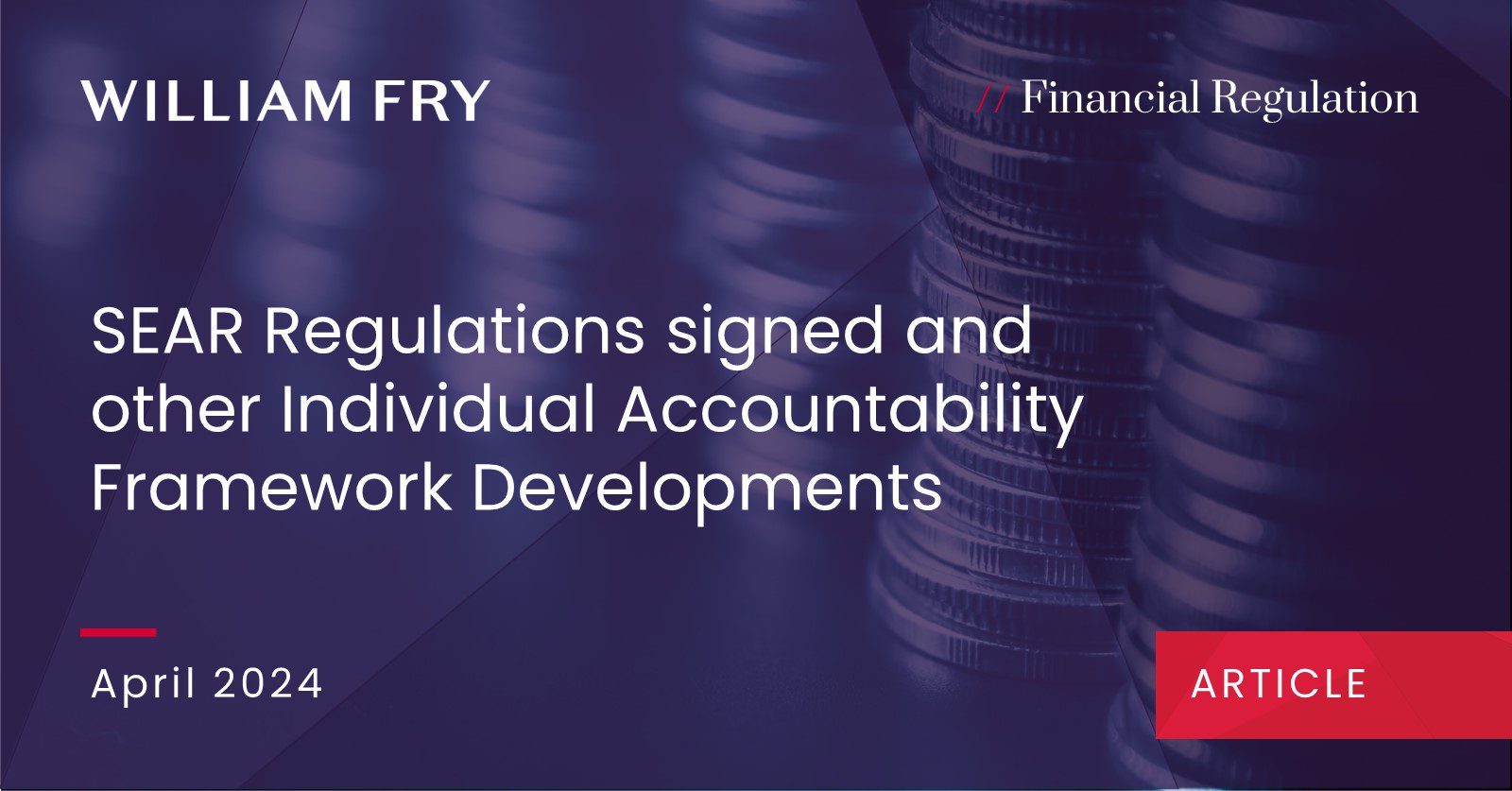Our Financial Regulation team examines recent developments on the Individual Accountability Framework (IAF) including the Senior Executive Accountability Regime (SEAR) Regulations signed by the Central Bank of Ireland (Central Bank), updated Central Bank Guidance on the IAF and the draft Standards for Business Regulations, which were published under the Central Bank’s consultation on reforms to the Consumer Protection Code (Code).
SEAR Regulations
On 12 April 2024, the Central Bank (Supervision and Enforcement) Act 2013 (Section 48(1)) (Senior Executive Accountability Regime) Regulations 2024 (SEAR Regulations) were signed by the Governor of the Central Bank.
SEAR is the last of the four pillars of the IAF remaining to be implemented. The SEAR Regulations will come into operation on 1 July 2024, with provisions relating to Non-Executive Directors becoming operative one year later (1 July 2025). Only a sub-set of regulated firms will be in-scope of SEAR in its first phase.
Changes to the signed SEAR Regulations, as against the draft version published by the Central Bank (together with a Feedback Statement on the IAF consultation process) in November 2023, are minimal and include:
- Definitions – A definition has been introduced for “branch of a third-country insurance undertaking“. The definitions of “pre-approval controlled function” and “PCF holder” have been removed (these terms will align with the terms specified in Schedule 2 to the Central Bank Reform Act, 2010 (Sections 20 and 22) Regulations) and the definitions of “relevant insurance undertaking” and “relevant investment firm” have been amended.
- Low-impact investment firms and third-country branches – these are not required to allocate prescribed responsibilities PR4, PR6, PR8, PR9, PR10, PR11 and PR12 as listed in the table in Schedule 2, Part 1 of the SEAR Regulations.
For further information on the Central Bank IAF consultation and feedback statement please see our article here.
Draft Standards for Business Regulations
On 7 March 2024, the Central Bank provided the awaited further detail on the IAF business conduct standards as part of a separate consultation on proposed updates to the Code.
Whilst common conduct standards and additional conduct standards have been applied to individuals in regulated firms since 29 December 2023, the business conduct standards applicable to firms will not be effective until the revised Code is implemented, which is expected to happen in early 2026.
The draft Standards for Business Regulations set out the following Standards for Business which regulated firms must adhere to:
- secure its customers’ interests;
- act with honesty and integrity;
- act with due skill, care and diligence;
- act in the best interests of customers and treat them fairly and professionally;
- ensure that all information it provides to customers is presented in a way that seeks to effectively inform the customer;
- control and manage its affairs and systems (including risk management systems, internal control mechanisms and governance arrangements) sustainably, responsibly and in a sound and prudent manner;
- maintain adequate financial resources;
- control and manage its affairs and systems to counter risks to customers of financial abuse (there is a new definition of “financial abuse” in the draft legislation); and
- engage and cooperate with the Central Bank and comparable competent authorities in good faith and without delay.
These standards are complemented by more granular Supporting Standards for Business, which (i) provide further details on how firms can meet the standards for business and (ii) ultimately will replace the existing General Principles as set out in Chapter 2 of the Code.
The Standards for Business will apply to all regulated financial service providers (other than those providing MiFID services, crowdfunding services or credit union savings and lending activities) in relation to all customers (as defined under the Standards for Business). Under proposed changes to the Code the annual turnover threshold for small corporates to meet the definition of “consumer” and be in scope of the Code will be raised from the current level of €3m to €5m.
Even though certain services (as outlined above) are outside the scope of the Standards for Business Regulations, the Central Bank expects firms providing these services to take the new Guidance on Securing Customers’ Interests into account in the context of their obligations to “act honestly, fairly and professionally in accordance with the best interests of its clients” under applicable legislation (e.g. the Irish MiFID Regulations and the EU Crowdfunding Regulation).
For further information on proposed revisions to the Central Bank consultation on the Code please see our article here.
Individual Accountability Framework Guidance
On 16 April 2024, the Central Bank published an updated version of the Guidance on the Individual Accountability Framework (IAF Guidance). Similar to the finalised version of the SEAR Regulations, the changes to the finalised IAF Guidance are minimal and include:
- The numbered PCF roles for Head of Material Business Line for Relevant Insurance Undertakings and Head of Material Business Line for Relevant Investment Firms (PCF 54 and PCF 55 respectively) have been inserted in the IAF Guidance.
- There is also a change from the obligation “to abide by” the Fitness and Probity Standards (F&P Standards) to “to comply with” the F&P Standards and some minor word changes to the Prescribed Responsibilities descriptions.
IAF Frequently Asked Questions & Guide for submitting IAF documentation
The Central Bank will also issue the following shortly:
- IAF Frequently Asked Questions to assist firms in their ongoing implementation of the Framework; and
- A system “How To” Guide for submitting IAF documentation.
For further information on IAF/SEAR please see our dedicated Individual Accountability & SEAR web page and our IAF/SEAR client briefing.
Contact Us
For more information, please contact Shane Kelleher, Louise Harrison, Hilary Rogers or any member of the Financial Regulation unit or your usual William Fry contact.
Contributed by: Jane Balfe




